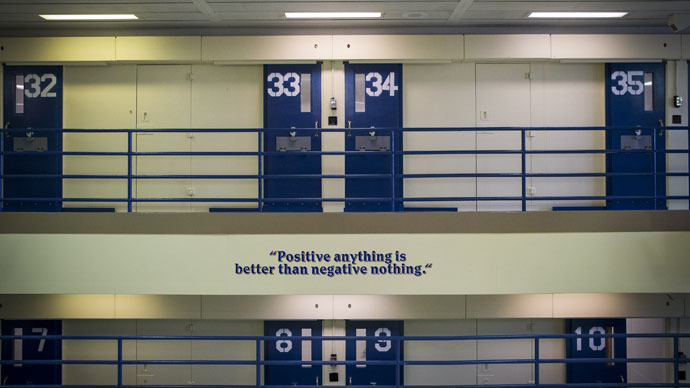Mississippi private prisons hold inmates longer, without reducing crime – study

Private prisons in Mississippi routinely extend inmate’s sentences by two to three months to leverage extra costs from the state, a new study found. However, the extended prison stays are having no effect on crime reduction.
The first-of-a-kind study from the University of Wisconsin compared time served by inmates in public and private prisons in Mississippi, between 1996 and 2004, to determine whether private prisons were more cost effective and whether they were leading to lower crime rates through rehabilitation programs.
READ MORE: 'Harrowing neglect, torture': Father told RT on son who starved to death in custody
The study found that private prison operators were increasing inmates’ prison sentences by 60 to 90 additional days (roughly 4 to 7 percent) for the average prisoner through a scheme of prison conduct violations. The additional two to three months were leading to an average additional cost per prisoner of $3,000 and eroding any costs savings the state was trying to achieve.
“If inmates sent to private prisons somehow serve longer terms, this undermines the very cost benefit that makes private prisons attractive relative to public prisons,” said Anita Mukherjee, an assistant professor of actuary science at the University of Wisconsin, and the study’s author, in a statement.
Mississippi has the highest incarceration rate in the US, with 40 percent of inmates held in private prisons. Since 1980, states have been contracting with private prison operators to help reduce costs and expand bed capacity, which has led to the US contracting 10 percent of its 2.3 million prison population out to private prisons. The private prison contracting industry is now worth $5 billion. Under Mississippi state law, private prisons have to provide cost savings of 10 percent compared to public prisons.
Mukherjee said states could structure incentives for private prison contractors that matched their public policy outcomes, whether it is reducing costs or reducing re-offending rates.
Reviewing the study’s findings, Nazgol Ghandnoosh, a prison activist with The Sentencing Project, told RT that states are not accruing savings when they contract with private prisons.
“One of the big differences is that private prisons appear to cost less per prisoner, but when you look at the contracts they specify they don’t want the most expensive prisoners – old prisoners and those that have high healthcare expenses, they will not accept those prisoners,” said Ghandnoosh.
“Generally, people in private prisons are younger and healthier. When you take that into consideration, states are not actually accruing any savings.”
In her study, Mukherjee also found that the use of prison conduct violations targeted all inmates in every demographic, offense and sentence length, and that those in private prisons accumulated more prison infractions than those in public prisons. State parole boards use infractions in assessing whether to give an inmate early release.
“Prisoners in private prison are 15 percent more likely to receive an infraction over the course of their sentence … virtually all reported infractions are recorded as ‘guilty,’” said Mukherjee. She added that “systematic differences in release policies constitute a distortion of justice.”
READ MORE: Ex-Riker Island guard jailed for 5yrs over inmate death
Mukherjee also found that because of the “distortion of justice,” the other “promise” of rehabilitation programs leading to a reduction in crime wasn’t fulfilled.
Ghandnoosh told RT that one of the other hidden facts about private prisons is they are likely to cut back on personnel and programming expenses.
“They are less likely to have unionized workers and they are likely to spend less money to train them, and they also provide fewer services within prisons,” said Ghandnoosh. “That contributes to making these prisons less safe environments, and it can contribute to the high recidivism [reoffending] rates we are seeing in these prisons.”












